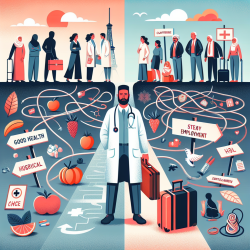Understanding the Health Impact of Migration on Iranian Immigrants
Migration is a complex journey that significantly impacts the health and well-being of individuals. A recent integrative literature review titled "The impact of migration on the health status of Iranians" sheds light on the challenges faced by Iranian immigrants and offers a conceptual framework to improve service delivery for this group. This blog explores the key findings of the study and how practitioners can apply these insights to enhance their skills and provide better support to immigrant populations.
Key Challenges Identified
The review analyzed 26 articles and identified several factors affecting the mental health of Iranian immigrants:
- Language Barriers: Limited proficiency in the host country's language can lead to social isolation, anxiety, and depression.
- Employment Challenges: Underemployment or unemployment can result in economic insecurity and mental health issues.
- Lack of Information: Insufficient knowledge about healthcare services can delay care-seeking behaviors.
- Social Support Deficits: The absence of a supportive network exacerbates stress and mental health problems.
- Discrimination: Experiences of discrimination contribute to depression and other mental disorders.
- Cultural Shock: Adjusting to new cultural norms can cause significant stress and conflict.
- Intimate Partner Violence: Some immigrants face domestic violence, which further impacts their mental health.
Practical Applications for Practitioners
Practitioners can enhance their skills by integrating the following strategies into their practice:
- Language Support: Offer language assistance services to help immigrants navigate healthcare systems and reduce communication barriers.
- Employment Assistance: Collaborate with local organizations to provide job placement services and workshops that enhance employability skills.
- Information Dissemination: Create easy-to-understand resources about available healthcare services and how to access them.
- Building Social Networks: Facilitate community-building activities that encourage social interaction and support among immigrants.
- Addressing Discrimination: Train staff to recognize and address discrimination, ensuring a welcoming and inclusive environment for all patients.
- Cultural Competency Training: Educate healthcare providers on cultural differences and sensitivities to improve patient interactions.
Encouraging Further Research
The review highlights the need for additional research to explore the socio-cultural values and challenges of migrants in host countries. Practitioners are encouraged to engage in or support research initiatives that focus on understanding the unique experiences of vulnerable populations, such as refugee children, women, and the elderly. Utilizing a strengths and resilience-based approach can be beneficial in developing effective interventions.
For practitioners interested in delving deeper into this topic, the original research paper provides comprehensive insights and is accessible through this link: The impact of migration on the health status of Iranians: an integrative literature review.










